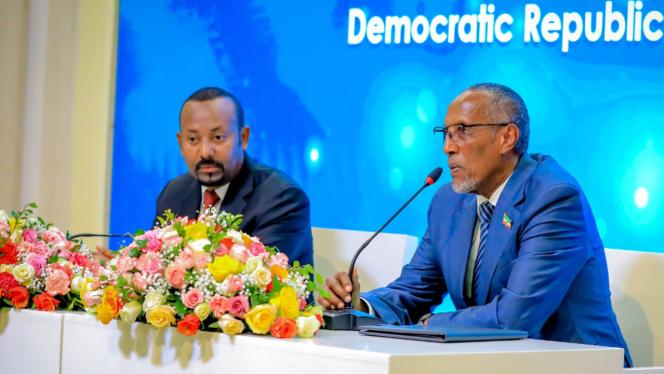Thursday 21 November 2024
Why does Somaliland want to lease its coastline to Ethiopia?

Ethiopia and Somaliland view the core transaction in the MoU as one that delivers on crucial concerns for both sides, but will the pact weather the diplomatic storm it has raised?
Just hours before signing the Memorandum of Understanding (MoU) with Ethiopia’s prime minister Abiy Ahmed, Somaliland’s President Muse Bihi was in Djibouti for talks with Somalia, which the country’s president, Ismail Omar Guelleh, was brokering. These discussions, hosted by the UK, Djibouti, and Turkey, did not yield concrete results regarding the future of Somalia-Somaliland relations. Talks between Hargeisa and Mogadishu have frustrated leaders on both sides who have remained far apart on what they hope to gain from dialogue. Somaliland’s elites hope to negotiate their legal exit from Somalia, whereas elites in Mogadishu hope to reign it back in.
Bihi’s decision to go to Addis Ababa after another round of failed talks represents a high-stakes gamble to achieve this goal. The MoU in this context represents a significant policy shift by both Addis Ababa and Hargeisa, upending the fraught geopolitics of the Horn of Africa, by upgrading Somaliland’s relationship with Ethiopia into a strategic one at Somalia’s expense. It grants Ethiopia access to the sea through a naval base and commercial port, while Somaliland claims that Ethiopia would recognise it as an independent state and grant it commercial shares in state companies like Ethiopian Airlines. Though one country recognising Somaliland isn’t the heralded victory its citizens have been hoping for, its foreign minister, Essa Kayd, has said he hopes that it would trigger a “domino effect” leading other countries to do the same. The support of Ethiopia – an African diplomatic heavyweight, a key security partner for the west and economic partner of China, Turkey and the UAE – Somaliland hopes will assist this endeavour.
Regional and international responses have been swift and decisive, emphasising the need to respect Somalia's territorial integrity and sovereignty. Djibouti’s president, who fears his own port may lose revenue with competition in Somaliland, has called it a “stab in the back” and Egypt has stressed that it would not allow any threats to Somalia’s security and sovereignty. The US has warned that the memorandum could embolden al-Shabaab who may exploit it to drive recruitment and the Cairo-based Arab League has come down strongly on the side of Somalia against Ethiopia. Somaliland has dismissed the reaction, vowing to press ahead with the deal, however Ethiopia has been less clear about whether it will fulfil a central part of the transaction for Somaliland’s leaders: whether they will extend full recognition to Somaliland.
Cashing out strategic dividends
Somaliland’s strategic location has always underscored its importance in the Horn of Africa. Despite being an unrecognised state at the mouth of the Red Sea, it has successfully kept piracy and terrorism at bay, ensuring the safety of not only itself but also Ethiopia and Djibouti. This has helped build political and security connections with western countries, regional states, and the Gulf. The ongoing turmoil in the Red Sea, due to Somali pirates and, more recently, the Houthis, has increased the number of states seeking strategic positions in the region to protect their maritime interests and exert influence.
The geostrategic significance of the Horn of Africa makes its states vital players. Djibouti, for instance, serves as the world’s most valuable military real estate, hosting multiple bases, including American and Chinese military installations. This, combined with its delicate political stability, has positioned Djibouti as a political and security leader in the Somali Peninsula. Moreover, its highly developed port infrastructure and integrated free zone make it an economic hub, handling 95% of Ethiopia’s imports and exports.
Somaliland now aims to leverage its position. Over the years, Hargeisa has been rumoured to have discussed establishing a military base on Somaliland’s coast with the UAE, Egypt, and more recently the United States. In each case, increased engagement and potential recognition were part of the negotiations.
Political win to secure recognition
Since the MoU’s announcement, there have been numerous statements and counterstatements regarding the agreement. Ethiopia remains committed to the MoU in principle, while Somalia has been lobbying for support and reassurance from various capitals and states. In this process, Somaliland’s voice has been overshadowed due to its absence from regional, continental, and international platforms where states usually communicate their positions. Tensions between Somalia and Ethiopia, which global leaders fear will undermine security cooperation against al-Shabaab, have further obscured Somaliland’s perspective. Nonetheless, this situation has brought international attention to Somaliland’s case for statehood again.
For over thirty years, Somaliland has unsuccessfully lobbied for international recognition. While some global powers are sympathetic to its cause, they are unwilling to be the first to change colonial borders, pushing the issue onto African states. African states, in turn, are reluctant to entertain the idea of altering colonial borders, fearing it would create further divisions. This hesitation also stems from concerns about sparking other secessionist movements within African states. Despite this, the African Union sent a fact-finding mission to Somaliland, which produced a report describing Somaliland’s case as “unique and self-justified in African political history,” stating that it should not be linked to the notion of “opening a Pandora’s box.”
The current administration in Hargeisa views the MoU as an opportunity to gain international recognition, propelled by Ethiopia. African scholar Redie Bereketeab discusses the success of unrecognised states, comparing South Sudan and Somaliland based on factors such as the interests of powerful states, the strategic importance of the seceding region, international recognition, and the central government’s attitude towards the seceding entity. Despite Somaliland’s strategic location and interest from powerful states, recognition has not been forthcoming due to Somalia’s persistent opposition to the idea and international apathy.
Economic prospects for Berbera
Economic development and revenue prospects are other driving factors behind Somaliland’s deal with Ethiopia. The recently rehabilitated Berbera Port, managed by UAE-owned DP World, is poised to serve Ethiopia’s need for alternative port access to Djibouti. The UK government has partnered with DP World to invest in Berbera Port, the Berbera Free Trade Zone, and the Berbera Corridor, connecting Berbera to Ethiopia. The city’s airport, renovated by the UAE, now offers much-needed cargo and passenger services, raising hopes for economic growth and revenue generation to support Somaliland’s fledgling economy, which relies heavily on livestock and remittances.
Ethiopia stands to benefit significantly from these developments. With one of Africa’s fastest-growing economies and a population of over 100 million, Ethiopia faces increasing port fees in Djibouti and a growing need for alternative ports. Addressing lawmakers earlier this month Ahmed reiterated his demand, saying “it is difficult to be landlocked with an economy of this size. It is a national interest issue”. It has engaged with ports in Kenya, Sudan, and Somaliland. Recently, Ethiopia signed an MoU with South Sudan to build an alternative oil pipeline route, primarily through Djibouti. Berbera Port could potentially become another venue for transporting South Sudanese oil.
Security partner in a volatile region
The Horn of Africa is a volatile region plagued by ongoing conflicts and security risks, including extremist groups like al-Shabaab and ISIS in Somalia. Despite recent successes against al-Shabaab, the Somali government has struggled to maintain momentum, with reports of gains being reversed. Additionally, US intelligence officials have briefed reporters at CNN that al-Shabaab has entered talks with Yemen’s Houthis for support in receiving arms. No evidence was provided to authenticate the report but if true this puts Somaliland and other regional countries at great risk. Without formal relations with global powers, Hargeisa finds itself isolated in this fight.
Since 2023, Somaliland has also lost the Sool region to unionist SSC-Khaatumo militias, who reject Somaliland’s separation from Somalia. This has weakened Somaliland’s territorial claims, but more crucially threatens to roll back security gains in Somaliland more broadly if its request for greater international engagement through recognition is not taken more seriously. A more constructive approach which engages with Somaliland’s central demand could create a more open atmosphere to dealing with demands of communities in the Sool region, instead of allowing the issue to fester.
Challenges ahead
The Ethiopia-Somaliland deal heralds significant changes to the region’s political and security landscape, but challenges remain. Regional opposition to the deal risks escalating tensions. Djibouti, threatened by the prospect of another competitor, has reportedly trained militias opposed to Somaliland’s rule in the Awdal region. Both Somaliland and Djibouti have accused each other of fomenting tensions. Meanwhile, Ethiopia and Somalia are at odds over the failure to resolve the crisis diplomatically. Turkey’s attempt to mediate between the two sides in Ankara yielded no results. Deteriorating relations further risk undermining Somalia’s fight against Al-Shabab in the southern regions, especially as ATMIS forces are set to leave later this year.
Domestically, Somaliland faces a heavily contested election where President Bihi is facing strong opposition, mainly from the Wadani Party. The party has repeatedly questioned the government’s mandate to negotiate such an important deal and raised concerns about transparency and due process regarding the MoU with Ethiopia. It remains unclear what the deal entails for both parties. The coinciding elections and the MoU might result in the government being distracted from one issue, leaving the other unresolved. Possible election delays could further polarise and lead to confrontation at a time when certain constituencies have electoral grievances.
The MoU between Ethiopia and Somaliland is a strategic move for both parties. For Somaliland, it represents a step towards international recognition and economic development. For Ethiopia, it offers alternative port access and enhanced security cooperation. However, the deal also brings significant challenges, including regional opposition and the risk of heightened tensions and conflict. The outcome of this agreement will profoundly influence the political and security landscape of the Horn of Africa for years to come.
--







